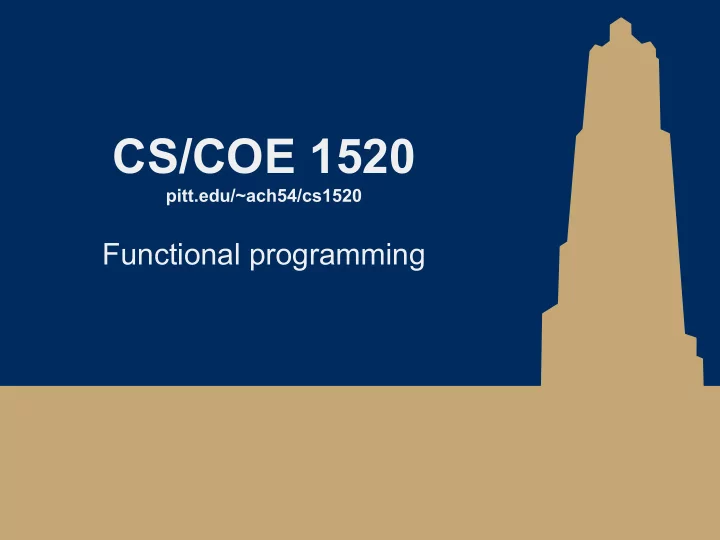

CS/COE 1520 pitt.edu/~ach54/cs1520 Functional programming
A challenge: ● Rewrite the following without using a loop: var data = [1, 2, 3, 4]; for (var i = 0; i < data.length; i++) { alert("loopin! " + data[i]); } 2
A different way of programming ● Functional programming ○ Data stored in the program should be immutable ○ Programs should run in a stateless manner 3
Pure functions ● Building blocks of functional programs ● Should be idempotent ○ Operate free from their timing relative to other operations ● Should be free of side-effects ○ Example side effects: ■ Mutate any shared state or mutable arguments ● Covered by having immutable data... ■ Don’t produce any observable output, e.g., ● Thrown exceptions ● Triggered events ● I/O to devices ● I/O to display ● Writes to a log ■ Note that this means our programs won't be composed entirely of pure functions 4
Guidelines for functional programming ● Your functions should never rely on outside values Operate only on data passed in as arguments ○ ● All of your functions must accept at least one argument ● All of your functions must return data or another function ● No loops 5
Let's consider getting this data from a server [ { "name": "Crosby", "age": 28, "points": [0, 0, 0, 1, 1, 0] }, { "name": "Malkin", "age": 29, "points": [1, 1, 0, 0, 0, 0] }, { "name": "Letang", "age": 29, "points": [1, 0, 1, 0, 1] } ] 6
Grab each player's average points per game Imperative approach -vs- Functional approach 7
DRYing totalAcrossArray() ● Array.reduce( callback [, initialValue ]) ○ callback is a reference to a function that will be called for every item in the array being reduced ■ Will be passed 4 arguments: ● The value previously returned in the last invocation of the callback, or initialValue, if supplied. ● The current value of the array being processed ● The index of the current element being processed ● The array on which reduce was called ■ What should our callback be if we wanted to use reduce() instead of totalAcrossArray()? 8
DRYing avgAllSubarrays() ● Array.map( callback [, thisArg ]) ○ callback is, again, a reference to a function that will be called for every item in the array being reduced ■ However, in this case, the result produced by each call is added into a result array instead of being passed to future calls ● Hence, is only passed 3 arguments: ○ Current value ○ Current index ○ Array ○ thisArg allows you to set what should be referenced by the this keyword within callback ○ What callback could we use to replace avgAllSubarrays()? 9
DRYing grab() ● How? 10
Another challenge ● What will this code output? var ex = []; for (var i = 0; i < 5; i++) { ex[i] = function() { document.write(i); }; } for (var j = 0; j < 5; j++) { ex[j](); } ● How can we get it to behave as intended? 11
Closure example var ex = []; function funcMaker(i) { return function() { document.write(i); }; } for (var i = 0; i < 5; i++) { ex[i] = funcMaker(i); } for (var j = 0; j < 5; j++) { ex[j](); } 12
This was only a brief intro to functional programming ● For a language designed around functional programming: ○ Haskell 13
Recommend
More recommend